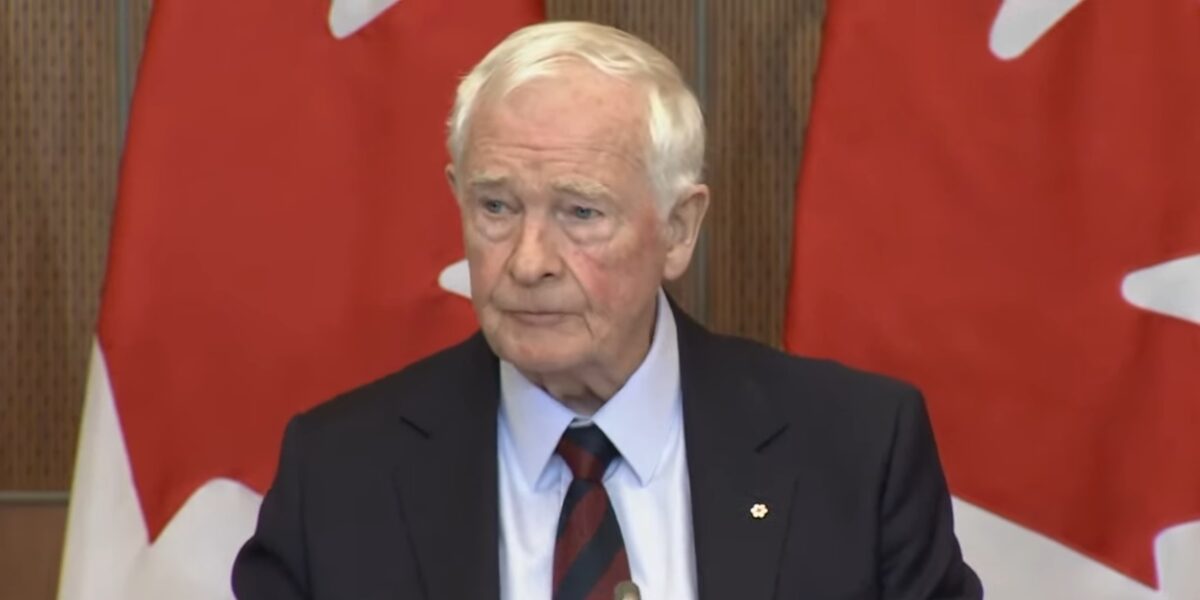In a press conference on Tuesday, May 23, David Johnston, former governor-general of Canada, reported to the public that Chinese political interference had not influenced recent federal elections.
“I have no examples of Ministers, the Prime Minister or their offices failing to act,” he said.
Johnston had been appointed by Prime Minister Justin Trudeau as a special rapporteur to investigate foreign political interference after reports by the Canadian Security Intelligence Service (CSIS) were leaked to the public and revealed that China had attempted to interfere with the 2019 and 2021 federal elections.
In his report, Johnston found that while foreign interference in Canada’s politics is a growing problem, that China had not influenced the results of the 2019 or 2021 elections. However, Johnston did not share publicly how he reached this conclusion and did not recommend a public inquiry into the matter.
“What has allowed me to determine whether there has in fact been interference cannot be disclosed publicly,” Johnston said. “A public review of classified intelligence simply cannot be done.”
Instead, Johnston recommended that the prime minister invite both intelligence oversight bodies, the National Security and Intelligence Committee of Parliamentarians (NSICOP) and the National Security and Intelligence Review Agency (NSIRA) to review the classified information and his report.
He explained that the reporting that had been done in the media on these allegations of interference was based on incomplete information.
“Much of what has been reported is based on limited and partial intelligence,” Johnston said. “That reporting has been made without the benefit of the full context provided by all relevant materials. Experienced intelligence professionals understand that individual pieces of intelligence must be viewed with considerable skepticism. It is extremely rare to draw conclusions, much less take action from a single intelligence report.”
He said that much of what has been reported in the media had been misconstrued.
“In some cases, the material I reviewed tell a very different story,” he said.
READ MORE: Canadians can undermine their own democracy without China’s help
Johnston further recommended that leaders of the Conservative Party of Canada (CPC), the NDP, and the Bloc Québecoise seek to obtain security clearances so that they may review the classified material in question as well.
For his part, CPC Leader and leader of the Opposition Pierre Poilievre stated that he would refuse to even attempt to view the classified information saying that he would never want to be restricted on what he can say in public.
A reputation hit job
As a part of his press conference on Tuesday, Johnston dedicated a significant amount of time to discussing allegations over his closeness with the family of the man who appointed him special rapporteur, Prime Minister Justin Trudeau.
Poilievre and his Conservatives created a narrative in the public alleging that Johnston and Trudeau were the closest of friends.
Johnston attempted to correct that perception, however, stating that his relationship with Justin Trudeau amounted to a few ski trips together when the latter was a youth, and that he served as principal of McGill University when Trudeau was a student there.
He explained that his family owned a condo at the foot of popular Quebec skiing destination Mont-Tremblant and that Trudeau’s father, Pierre Elliott Trudeau, had a cottage 50 kilometres away in Val-Morin.
He said that his contact with Justin Trudeau at that time was limited to driving the youth home to his father’s on a couple of occasions after skiing and that there was no other significant contact between the two until Trudeau became an MP while Johnston was serving as governor-general.
Johnston also had to account for his relationship with the Pierre Elliott Trudeau Foundation. Johnston is a member of the foundation, which he explained as being akin to a shareholder of a corporation.
“About a year after I became governor-general, I was invited to become an associate of the foundation, which is like being a shareholder of a company,” he said, stating that he had only been to four of five of the foundation’s general meetings.
He further explained that his donations to the foundation amounted to between $300 to $400 a year, which he said is less than one per cent of his and his wife’s annual charitable contributions.
These explanations were not enough for Poilievre however, who continued to call Johnston “a ski buddy, cottage neighbour and family friend,” in a press statement on Tuesday.
This Liberal operative and close family friend of the Trudeaus was seen as independent enough to be appointed to Canada’s highest office, governor-general by former Conservative prime minister and Poilievre mentor Stephen Harper in 2010.
Public confidence not restored by Johnston’s report
Despite his attempts to defend his impartiality and his arguments that the evidence he based his conclusions on must be kept secret, Johnston drew criticism from across the political spectrum and not just from Poilievre.
NDP leader Jagmeet Singh stated nothing short of a full public inquiry will restore confidence in Canada’s democratic institutions.
Nothing short of an independent public inquiry on foreign interference is good enough.
I’m deeply disappointed in the rapporteur’s report.
We’ll be taking these concerns directly to the PM and use all our tools in Parliament to get answers for Canadians.
— Jagmeet Singh (@theJagmeetSingh) May 23, 2023
In his own response, Prime Minister Trudeau defended Johnston’s integrity, pointing out that he was appointed governor-general by a Conservative and urged his fellow party leaders to apply for security clearances to view the evidence.
“I look forward to party leaders choosing to actually get the security clearances necessary to see the facts that underpin this report,” Trudeau said on Tuesday.
While the evidence that Johnston based his report on will be kept classified, Johnston will be holding further public hearings on matters such as the way threats are communicated from intelligence agencies and government officials.



